20 ways to bond with your bird
Looking improve your relationship with your bird? These simple tips will bring you closer
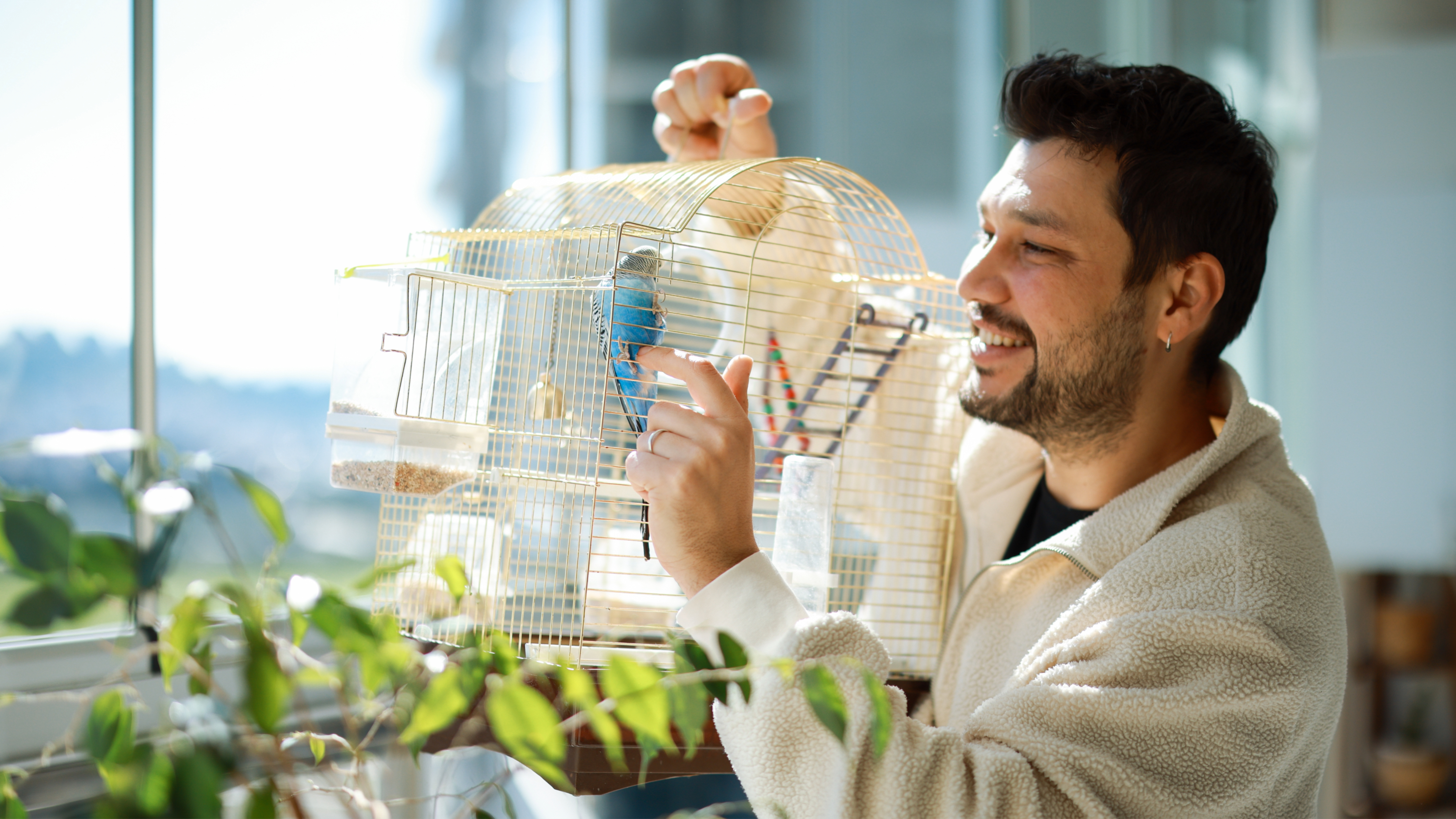
If you've just welcomed a new feathered friend into your life and are looking for ways to bond with your bird, you'll find so many wonderful tips in this guide.
Birds make fantastic companions, but just like us, they all have their own unique personality so some may forge an instant connection with you while others may take time to warm up.
When it comes to our top tips for taking care of pet birds, nurturing the relationship you share with them is high on the list. Depending on where you get your beaked buddy from, they may have had previous experiences that have left them shy or even fearful of humans. But rest assured, with a little love and care, you can develop a fulfilling and meaningful relationship with your pet.
Below, we share a range of ways to bond with your pet bird. Oh, and spoiler alert: number 16 is our absolute favorite!
Ways to bond with your bird
1. Spend time near their cage
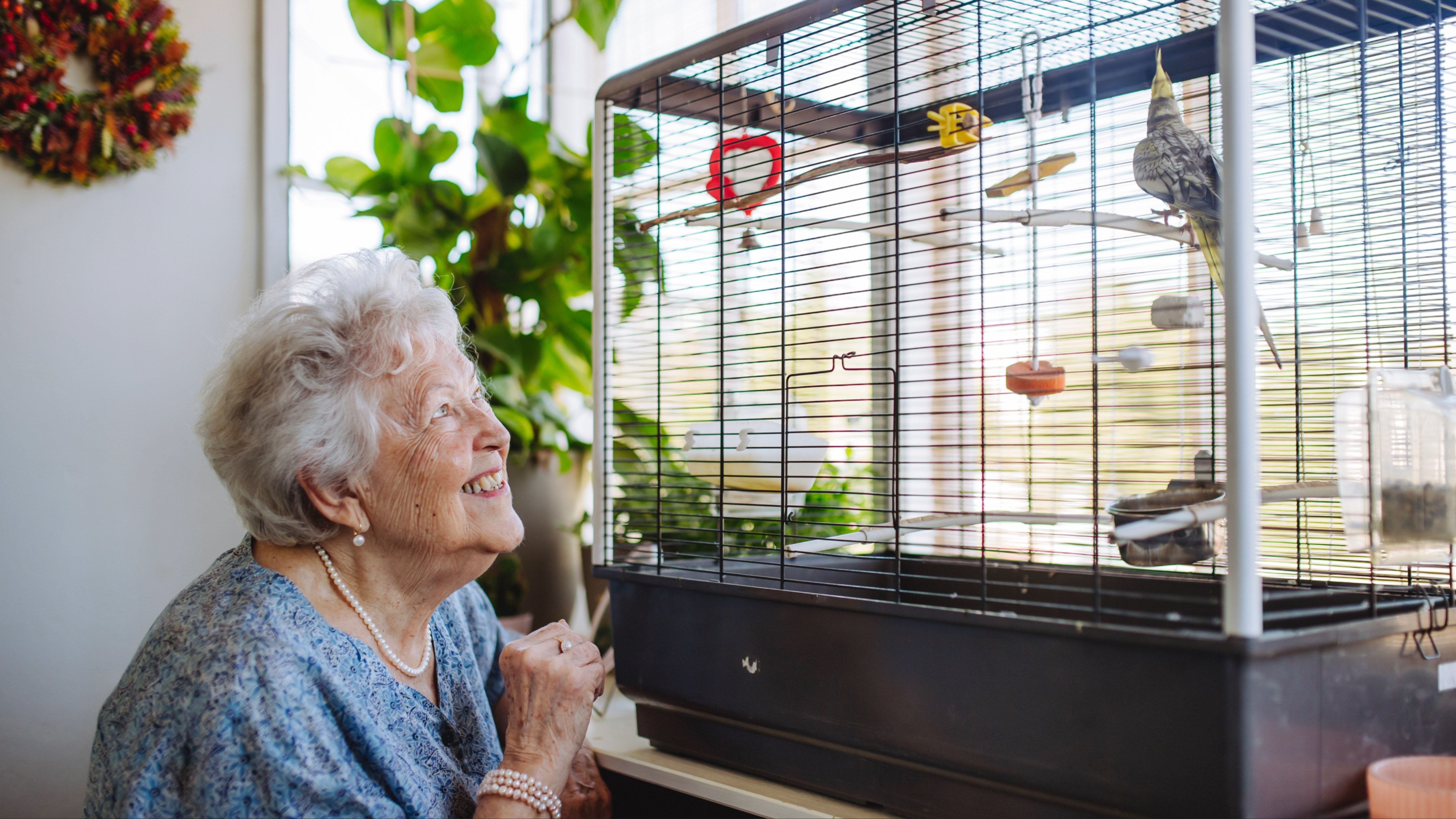
While it may seem simple, one of the best things you can do to start to build a bond with your bird is to sit by their cage. Once you've invested in the best bird cage, place the cage in a frequently used room so your bird can get used to your presence.
Spend time each day sitting near their cage. You might place a chair right beside or sit across the room and quietly read a book. Practice doing this each day at various times so they get used to you coming and going. Once they're comfortable with your presence (they're vocalizing and appear curious), you can open the cage door and start to interact with them in a closer way.
2. Handle them gently
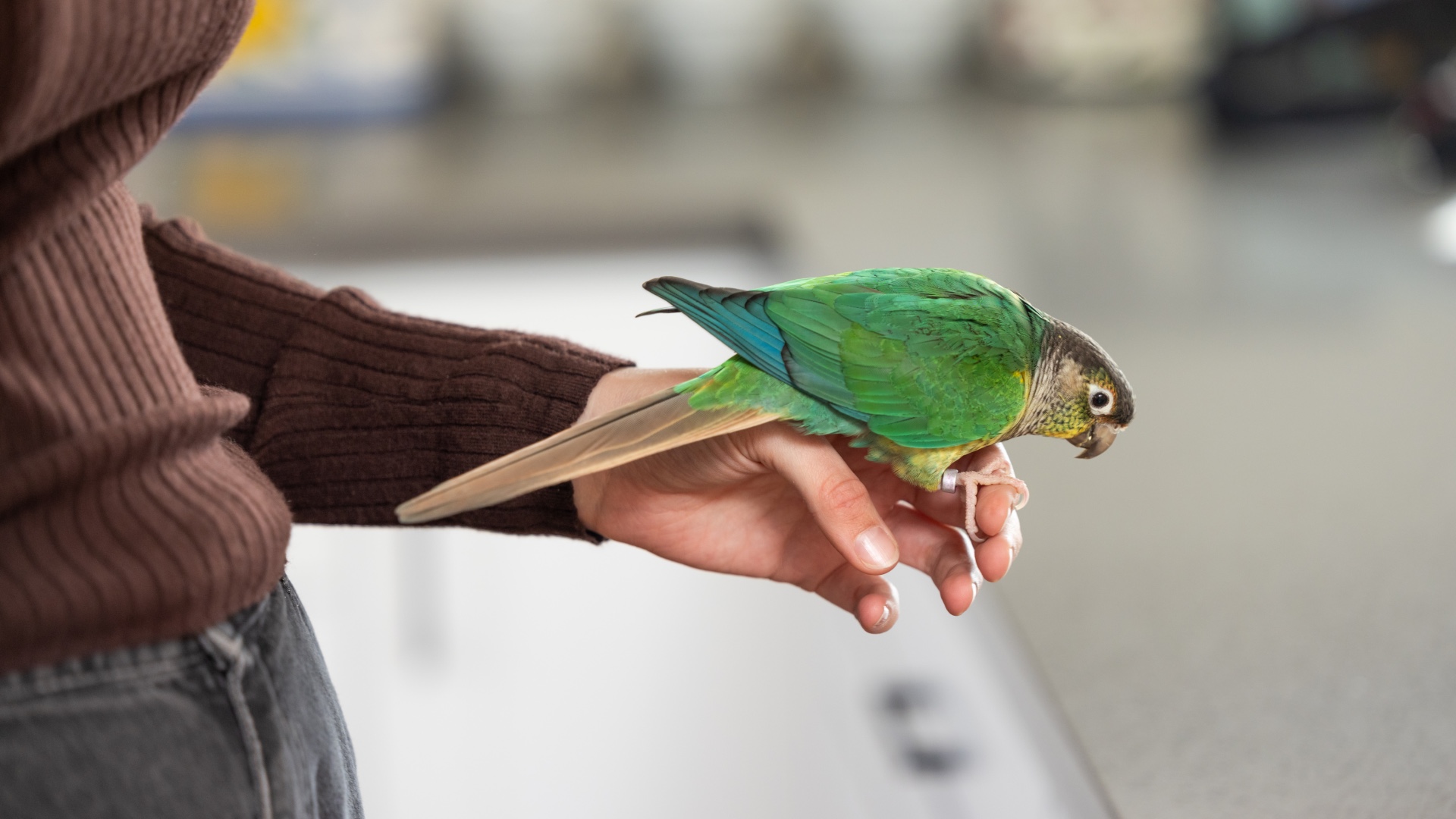
Once your bird is used to your presence and seems comfortable having you nearby, you can start to introduce some gentle physical contact. Being able to handle your bird is important, as not only does it deepen the bond you share, but there may be times where you want to groom them or inspect them for injuries – having them trust you enough to let you handle them will make the job a whole lot easier!
Get the best advice, tips and top tech for your beloved Pets
Start by gently stroking their head or neck, these are the two areas that birds typically enjoy having touched. Take care to avoid any areas below the neck as touching their back or feathers can stimulate their hormones and lead to unwanted breeding behaviors. Once you've earned your bird's trust, you can work up to other forms of physical contact, such as encouraging them to perch on your arm or shoulder.
3. Speak in a soft and gentle voice
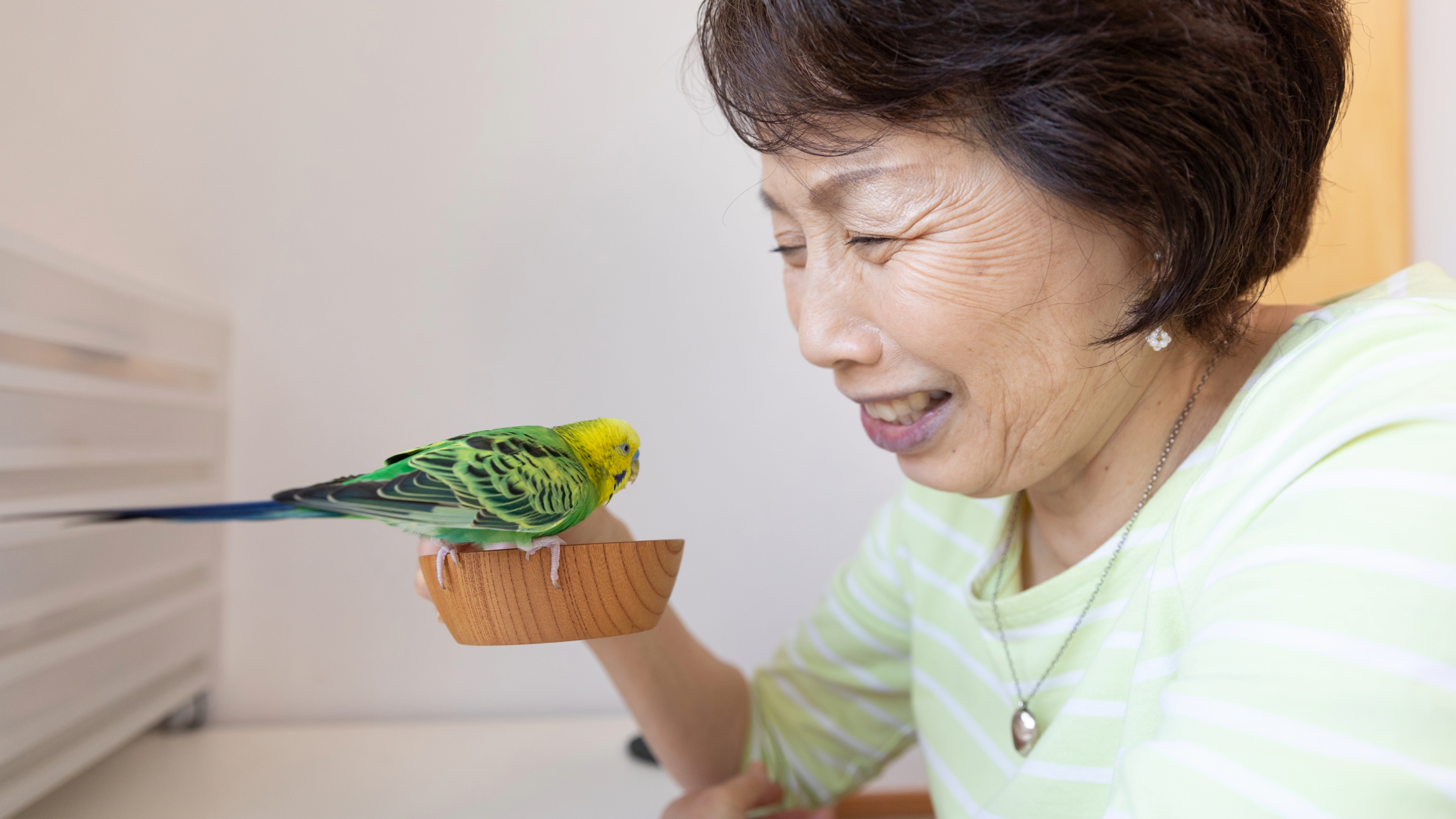
When interacting with your pet bird, it's generally best to speak to them in a soft and calm voice. Birds are sensitive to loud noises, and using a quiet tone of voice helps to create a soothing environment for them. Not only that, but a gentle voice can strengthen your bond by ensuring your bird sees you as a trustworthy friend.
4. Play with your bird
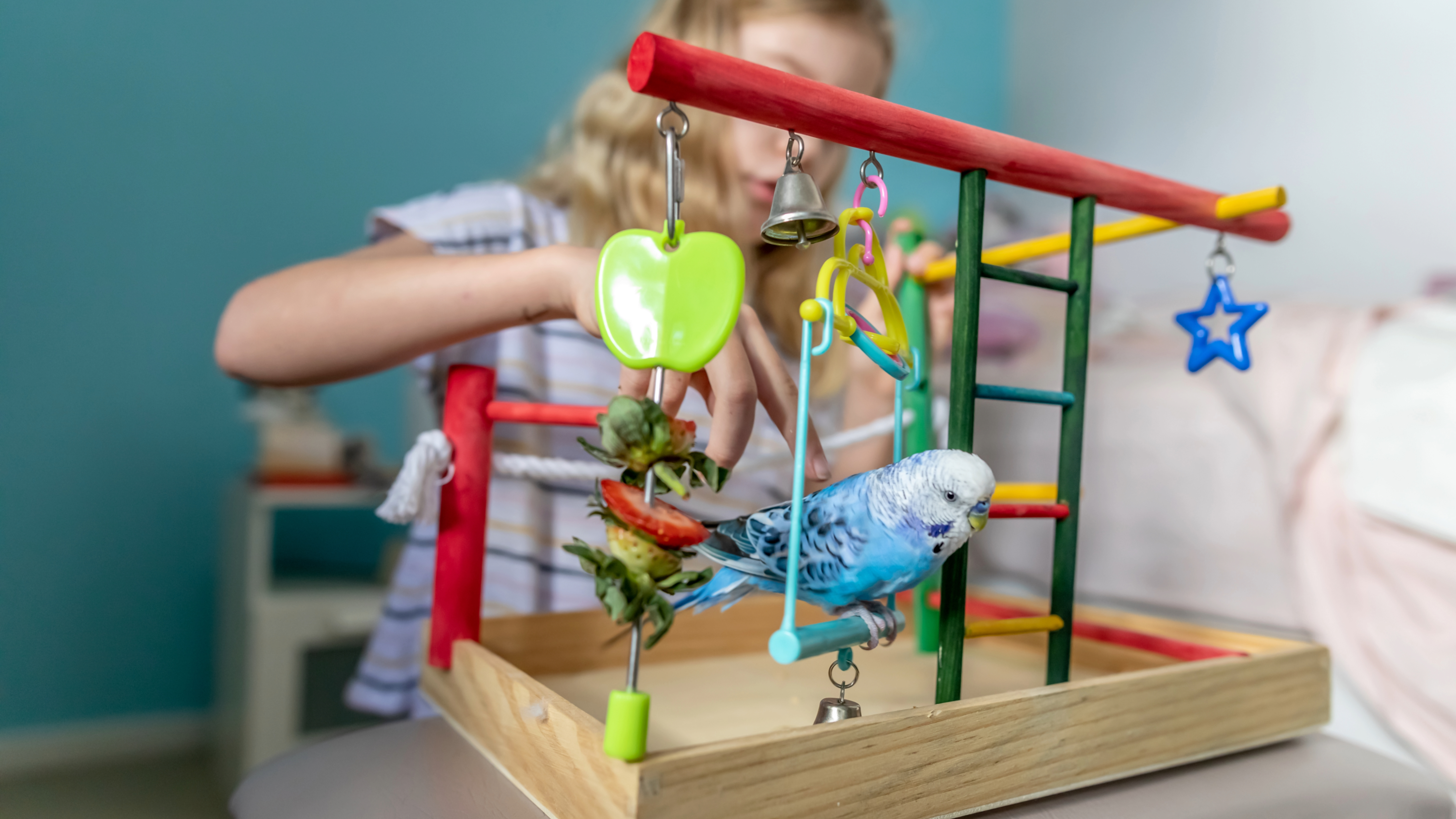
One of the most effective ways to bond with your pet bird is to spend time playing with them. Offering your feathered friend lots of mental and physical stimulation with the best toys for birds can be a fantastic way to build a friendship built on fun, safety, and trust.
Pop lots of different toys in their habitat, but also leave their cage door open so that they have the whole room to use. Giving your bird lots of enrichment opportunities can ward off boredom and help prevent destructive behaviors.
5. Offer them treats
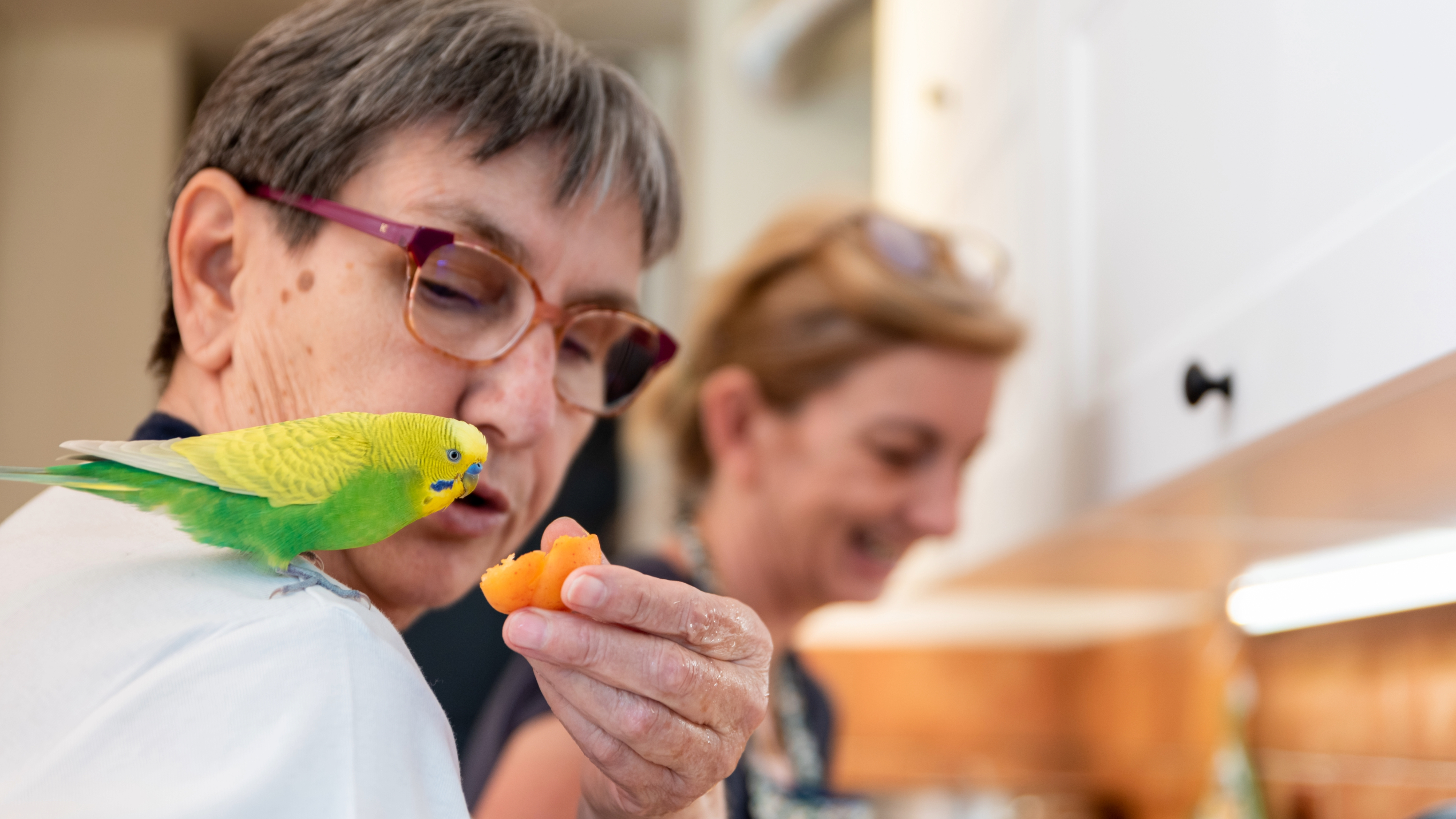
There are plenty of nutritious things birds can eat other than bird food – such as apples, bananas, and hard-boiled eggs, to name a few! Nothing will make a bird view you as their favorite person more than offering them a tasty treat, just be sure to keep their diet healthy and balanced to prevent weight gain.
6. Train them
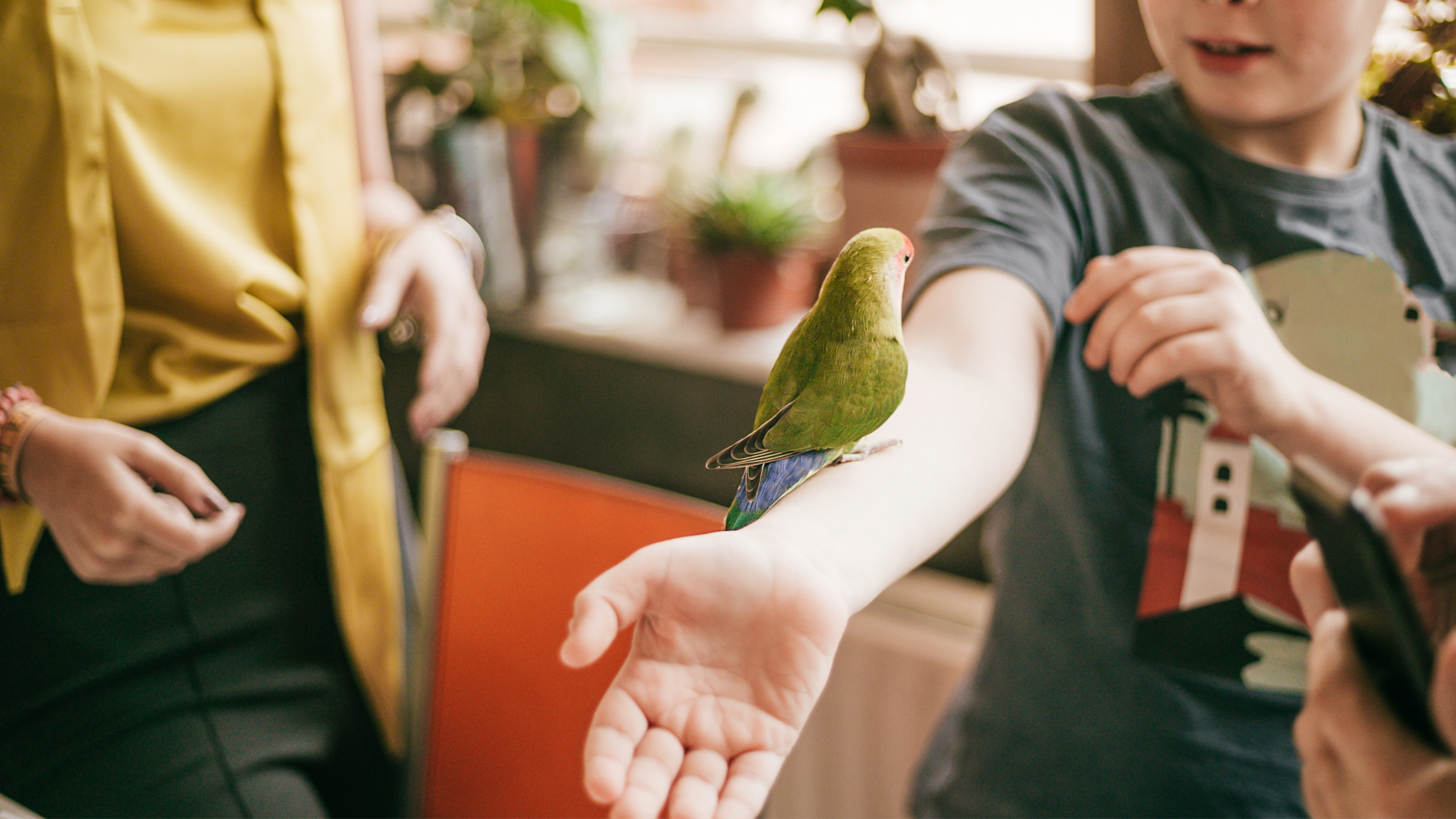
Did you know that you can train your feathered friend? It's true! Birds are highly intelligent, and because they love mental and physical stimulation, most are very responsive to training. From teaching them to perform tricks to getting them to repeat different words, you'll find training your bird isn't just great for strengthening your bond, it's incredibly fun, too.
7. Give hand feeding a go
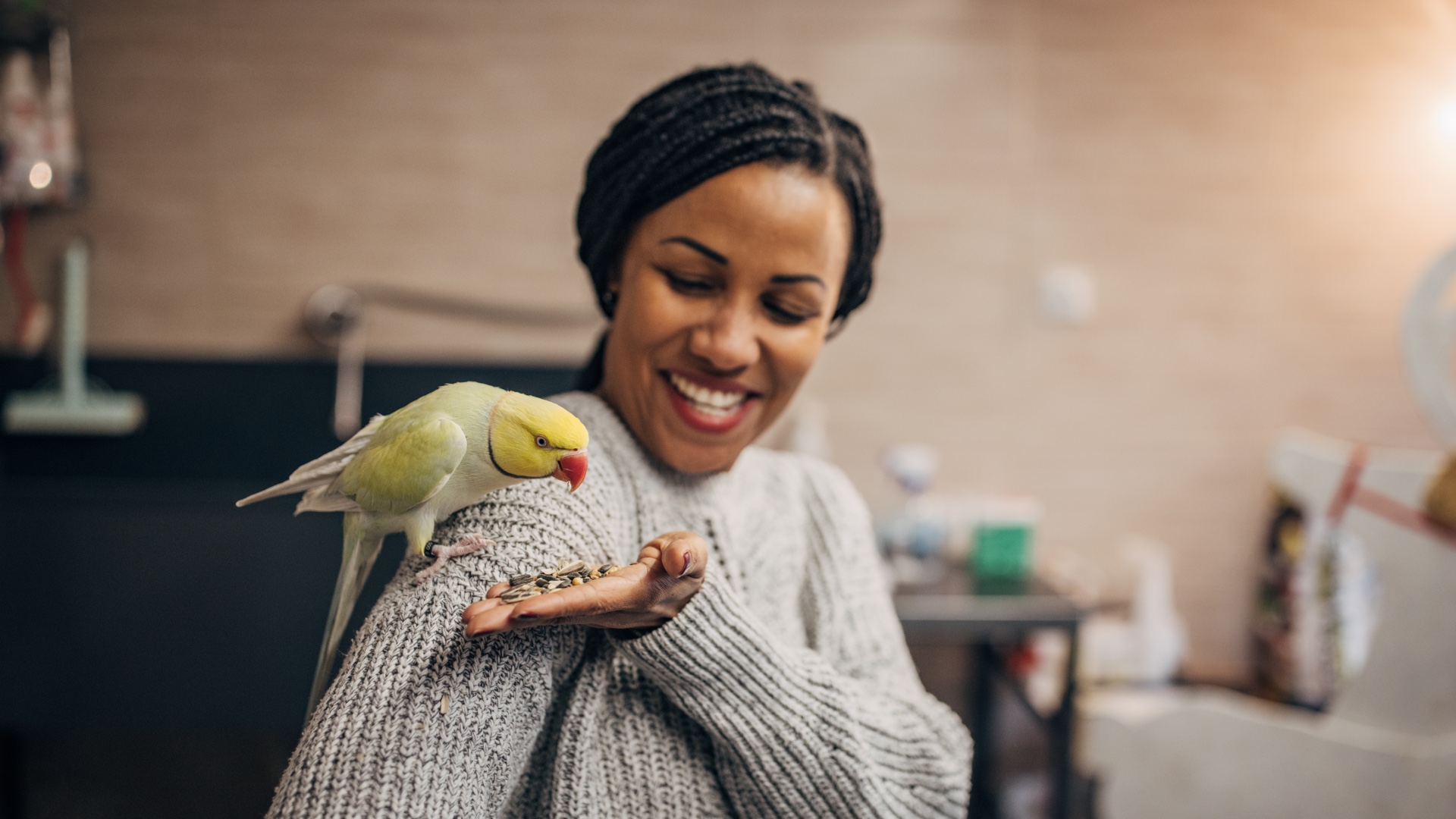
Hand feeding can be a great way to build trust with your bird and help them see you as a safe and friendly presence in their life. First, you'll want to choose what you're going to feed them – their favorite seed mix or small pieces of fruit and vegetables can be a great choice.
To begin with, try offering these treats through the bars of your bird's cage. This can be a good way to help establish a rapport with birds who may be shy or lacking in confidence. If they seem happy to take food through the bars, you can try opening the cage door and resting the food in your palm. Don't force any interactions and instead let your feathered friend come to you.
8. Avoid loud noises
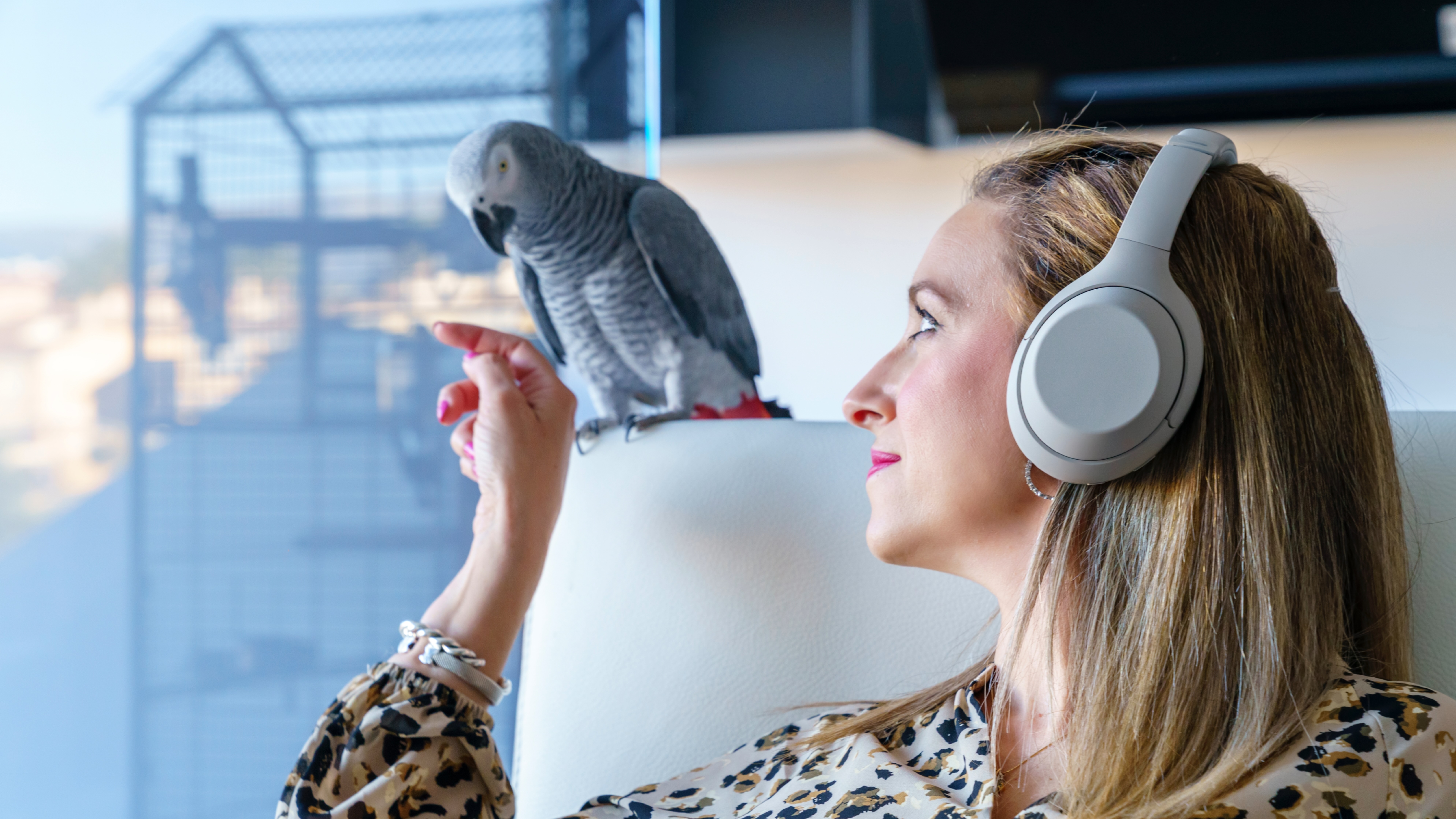
Most pet birds are not fond of loud noises. While you don't have to keep your feathered friend shut away in a completely silent room, constant, loud sounds are stressful for birds and can result in chronic stress and even behavioral problems.
It's worth noting that consistent, predictable sounds (like the sound of you chatting, the TV on at a normal volume, and comings and goings in your home) are fine for birds, and they tend to adapt well to these. However, you'll want to avoid playing very loud music or having too much hustle and bustle around your bird.
9. Don't force interactions
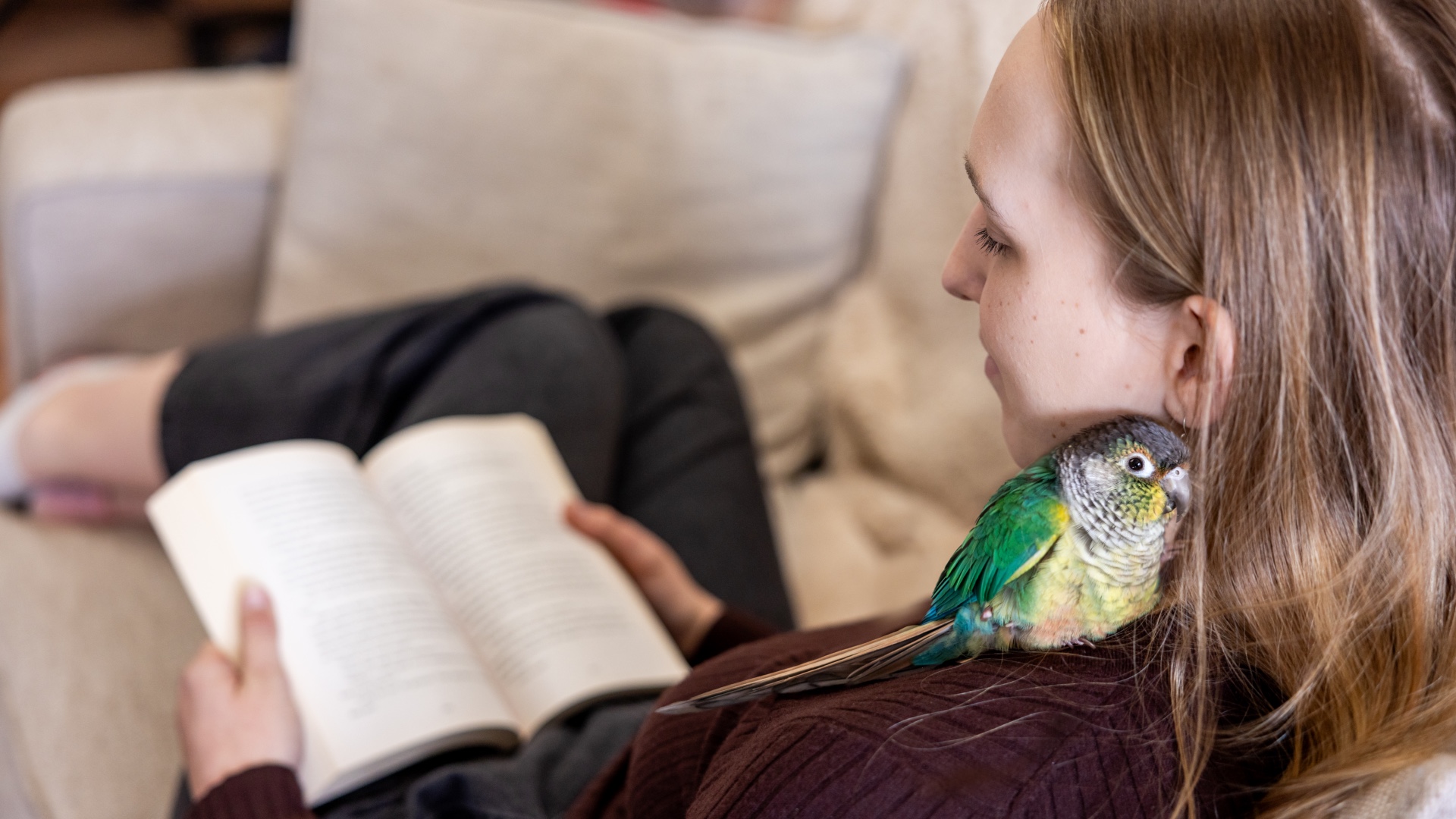
While it can be tempting to try to fast-track the relationship you have with your beaked buddy, never force them to interact with you. As with any person or other animal in your life, it's important to respect your bird's boundaries. Always go at your bird's pace and let them come to you – starting small is the key to building trust.
10. Share a meal with your bird
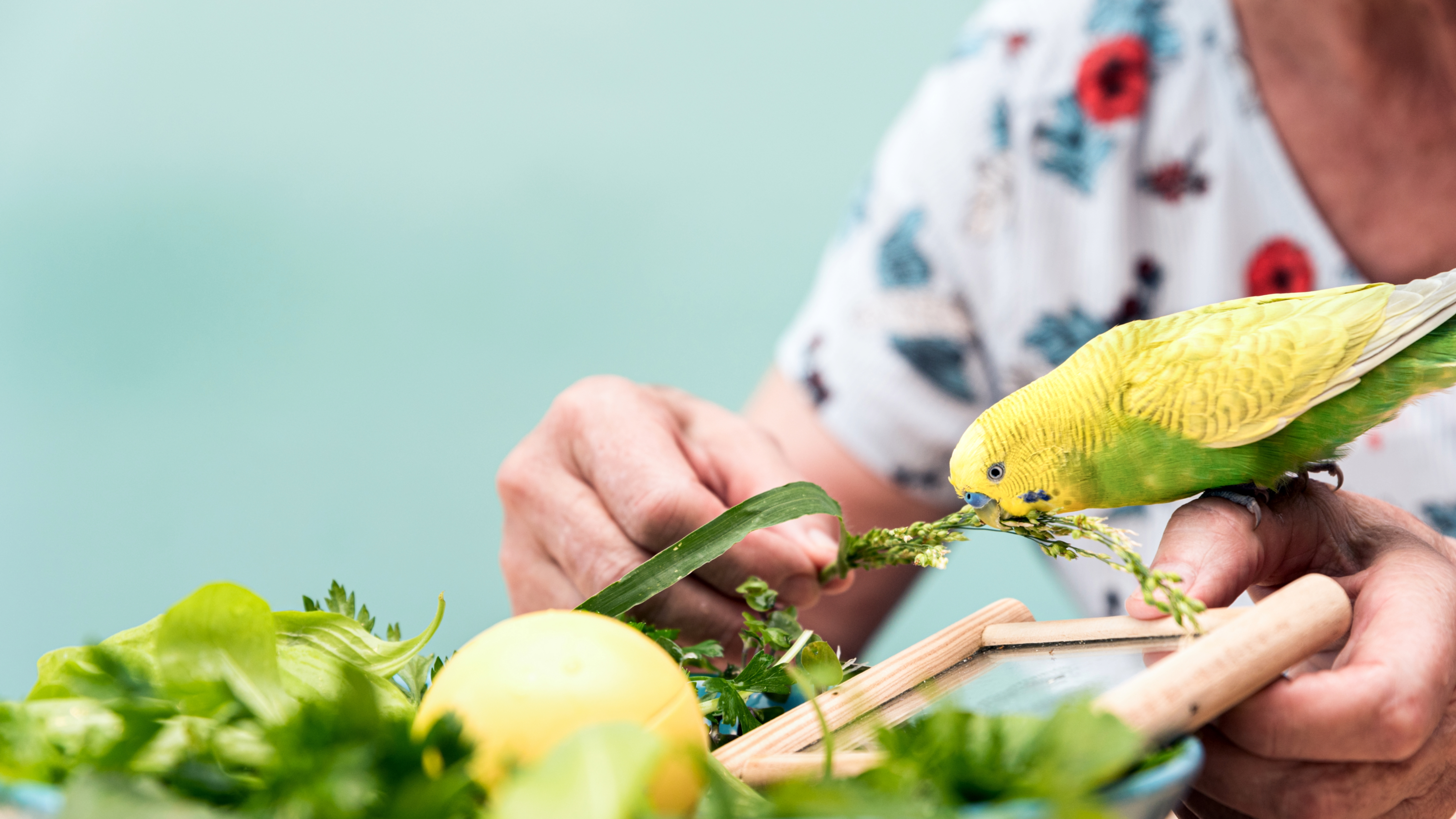
Bonded birds in the wild will often share food with one another as a way of strengthening their relationship, so why not sit down to dinner with your feathered friend? Sharing food that's safe and non-toxic to birds is a great way to get your beaked buddy to see you as part of their flock.
11. Groom them
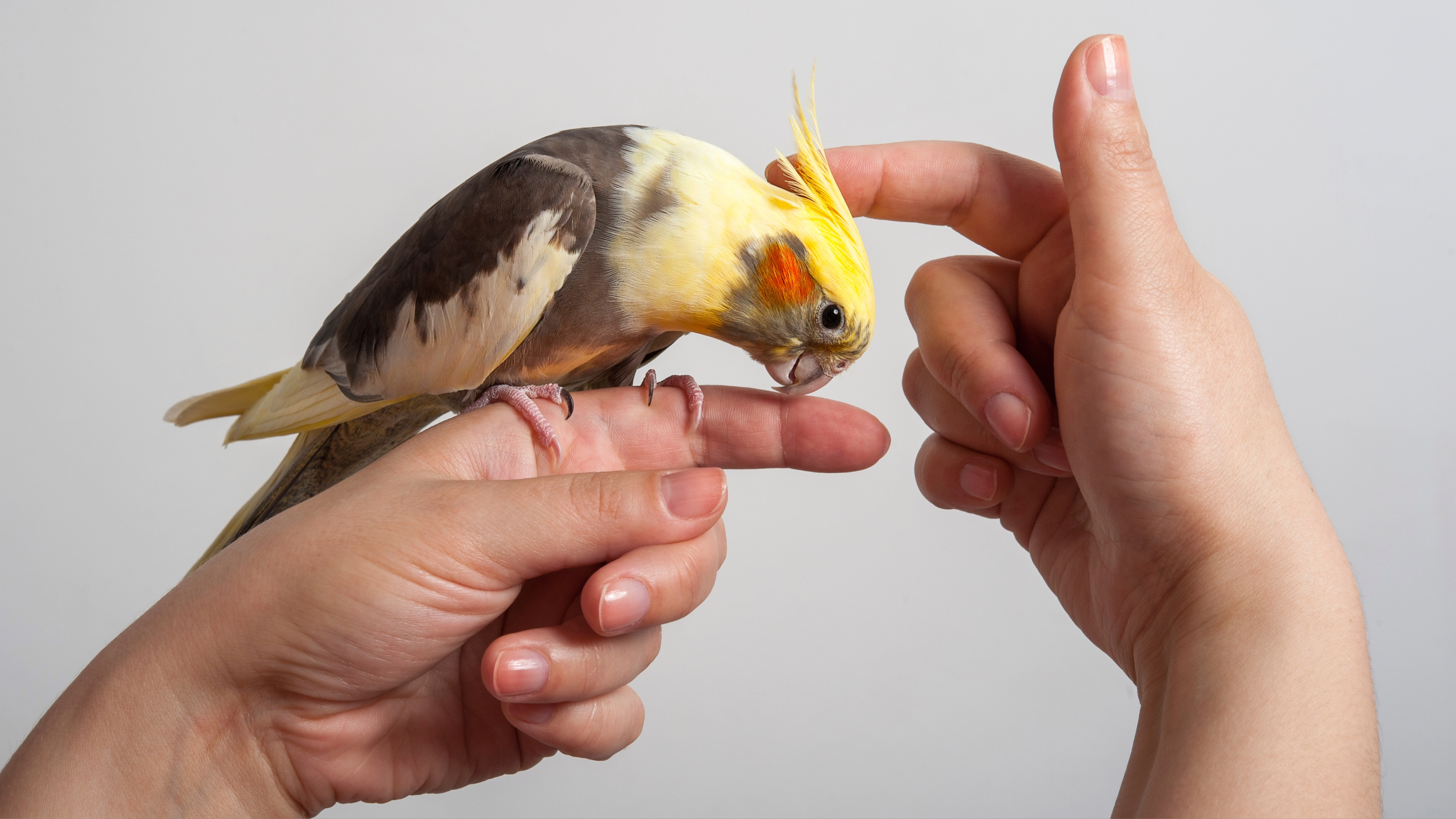
Grooming your bird can be a wonderful way to bond with them, as this mimics the natural behavior they'd engage in with their own flock if they were in the wild. Grooming needs to be done very gently and only if your bird agrees to it.
You can start by giving them a little head scratch and seeing how they respond. If they seem happy with that, you could try removing any loose feathers that you can see before working your way up to trimming their nails. Take it slowly and use lots of positive reinforcement in the form of treats and praise.
12. Socialize with your bird
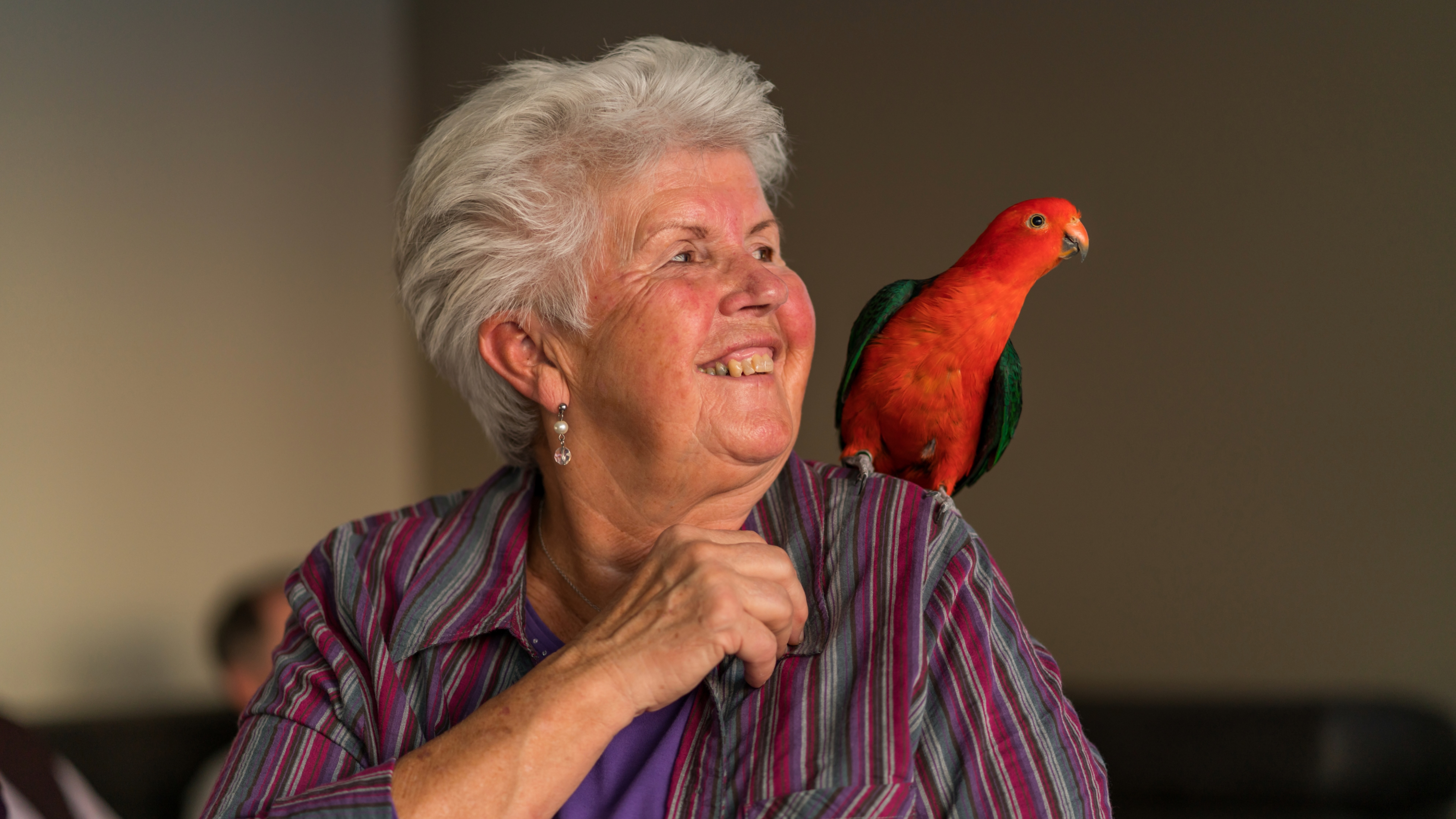
Birds are incredibly smart creatures, and they remember the interactions they have with humans – both the good and the bad. Spending time hanging out with your beaked buddy is an important part of building a bond with them, and it's especially crucial if you've rescued them from a shelter.
Birds that have had negative experiences with previous owners can be nervous around people, so letting them be in your presence in a calm and gentle way can help them to rebuild broken trust. Sit with your bird and talk to them, they will absolutely be able to sense your kind energy, and gradually, your feathered friend will begin to feel safe enough that you can increase the amount of time you spend with them.
13. Use verbal praise
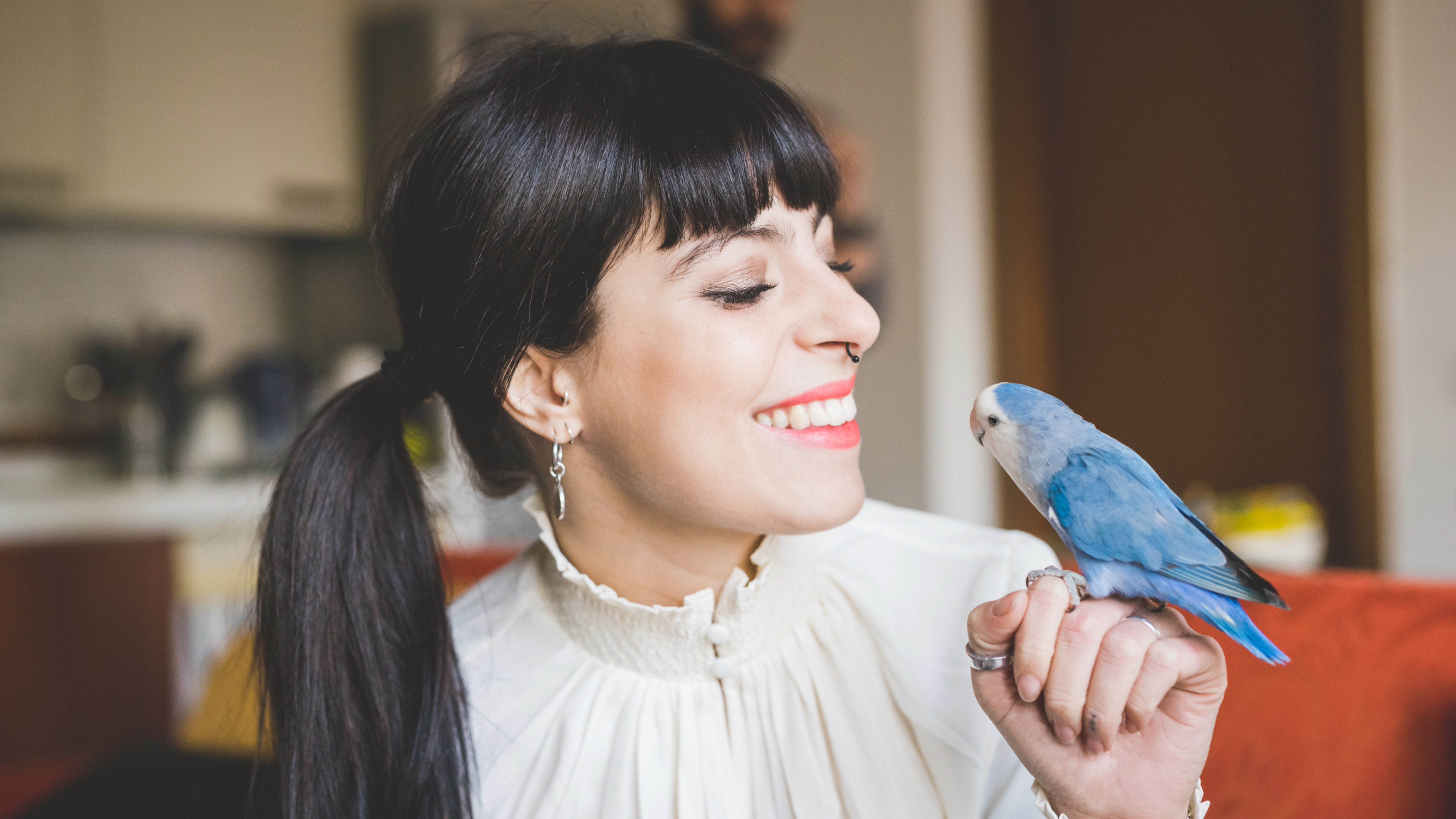
Offering your pet lots of positive verbal praise is a great way to encourage desirable behaviors. Every time your bird does something you like or want to see more of, such as eating out of your hand, letting you pet them, or perching on your arm, reward them by saying things like “good bird” or “I love you”. This will help your bird associate your voice and presence with positive experiences.
14. Get to know your bird
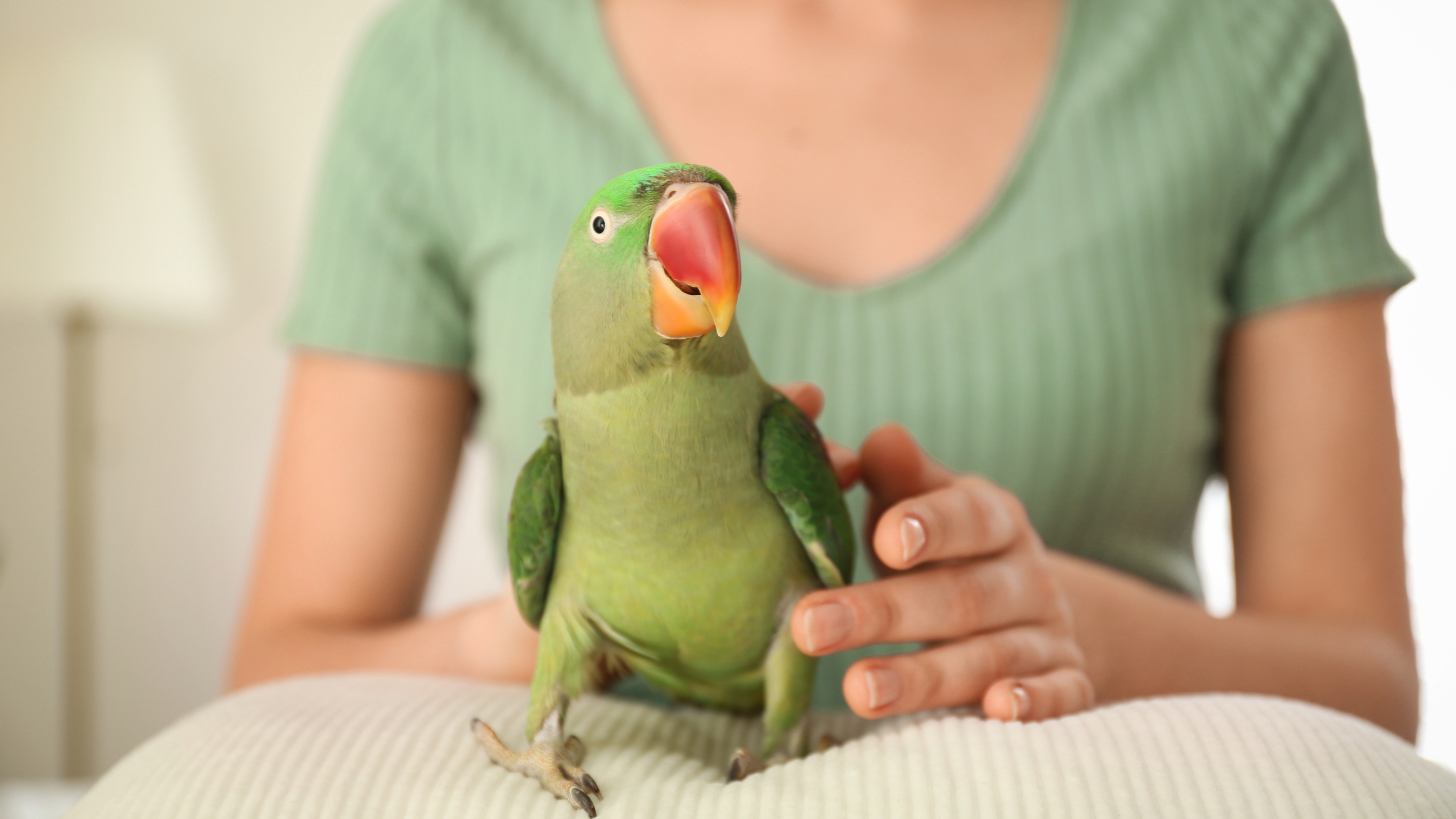
One of the best ways to bond with your bird is to really get to know and understand them. Observe their behavior, body language, and vocalizations. Is your new beaked buddy loud and extroverted, or are they quiet and reserved? Do they seem confident straight out of the gate, or do you notice they appear anxious or nervous?
Just like each human is unique, so too is each bird. Learning all about your feathered friend, including their individual preferences, likes, and dislikes, will help you meet their needs and build trust.
15. Sing to them
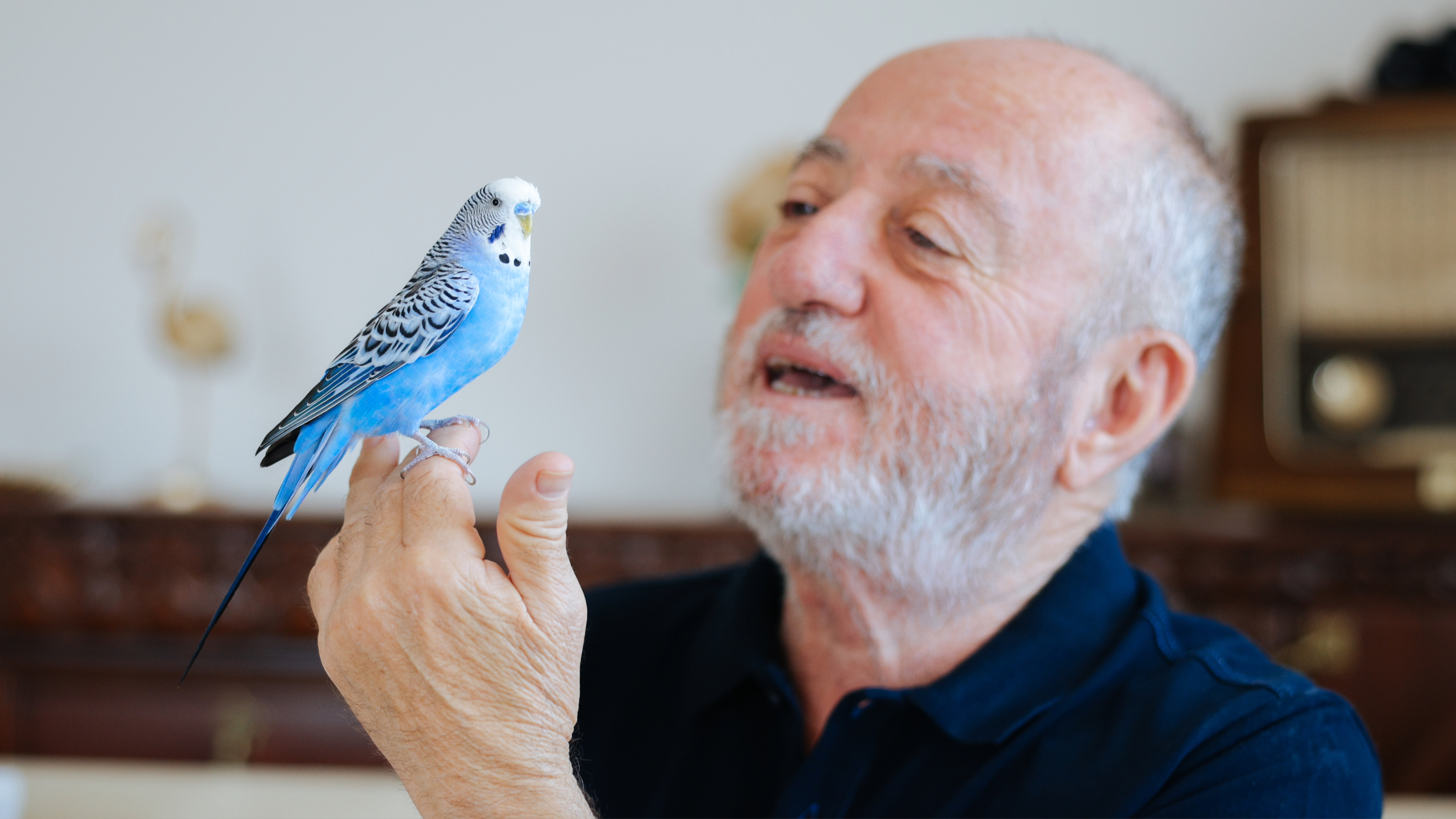
Communication is a big part of all relationships, including the ones we share with our pets. Birds are naturally social and talkative creatures who love to vocalize, and in the wild, they'll often use various whistles and song-type sounds to stay connected to their flock.
When you sing to your bird, you're literally speaking their language, and this can be a wonderful way to help them feel deeply bonded to you. Bonus points if you use a calm and gentle tone, as most birds find this deeply soothing.
16. Dance with your bird
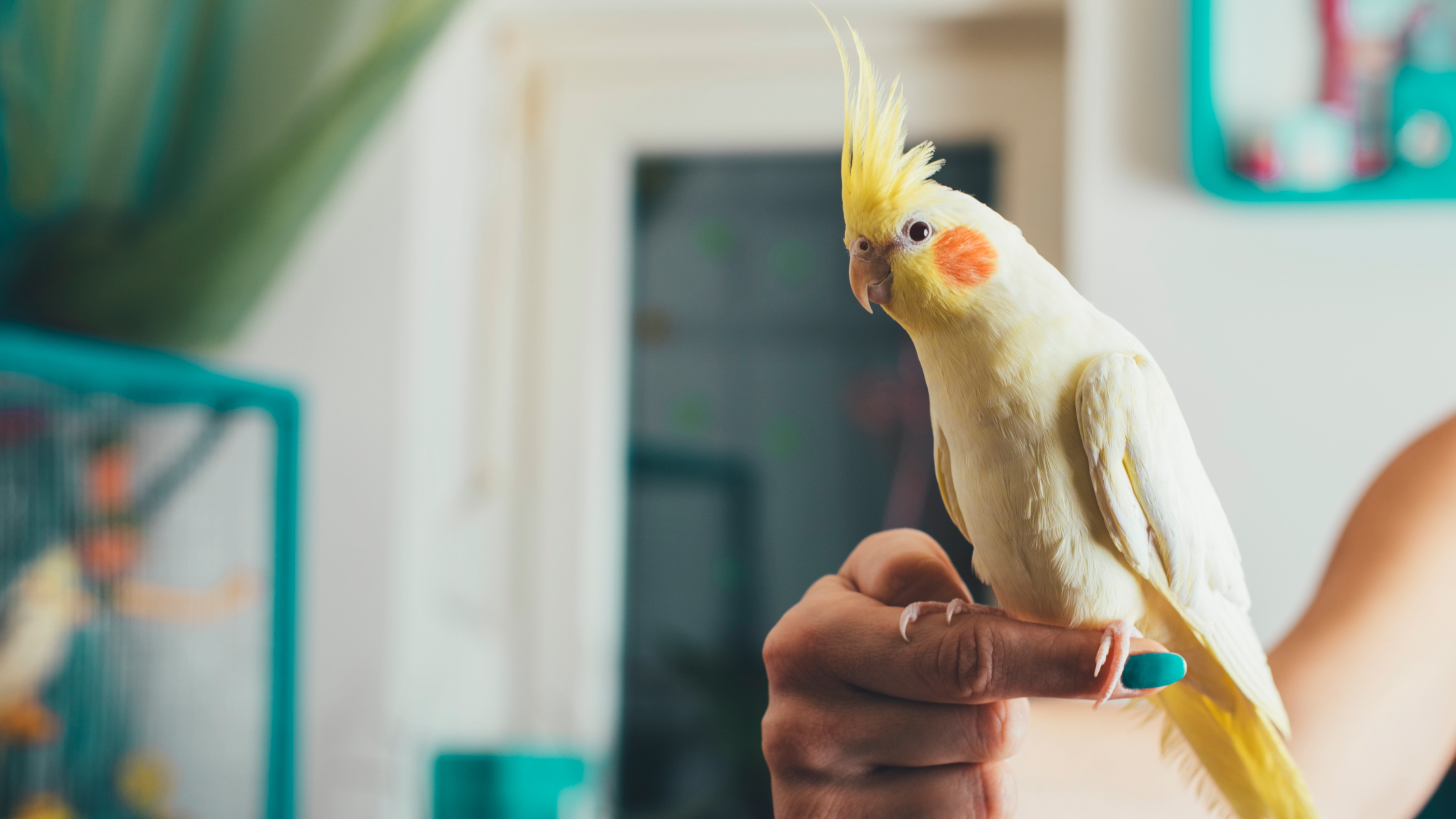
We know, it sounds odd, but many birds respond really well to music and love to have a bit of a dance. Dancing with your feather friend can be such a fun way to bond, and you may just find your beaked buddy copies your moves! Select some upbeat, rhythmic music and start by bobbing your head about – it's highly likely your pet will soon join in.
17. Avoid intense eye contact
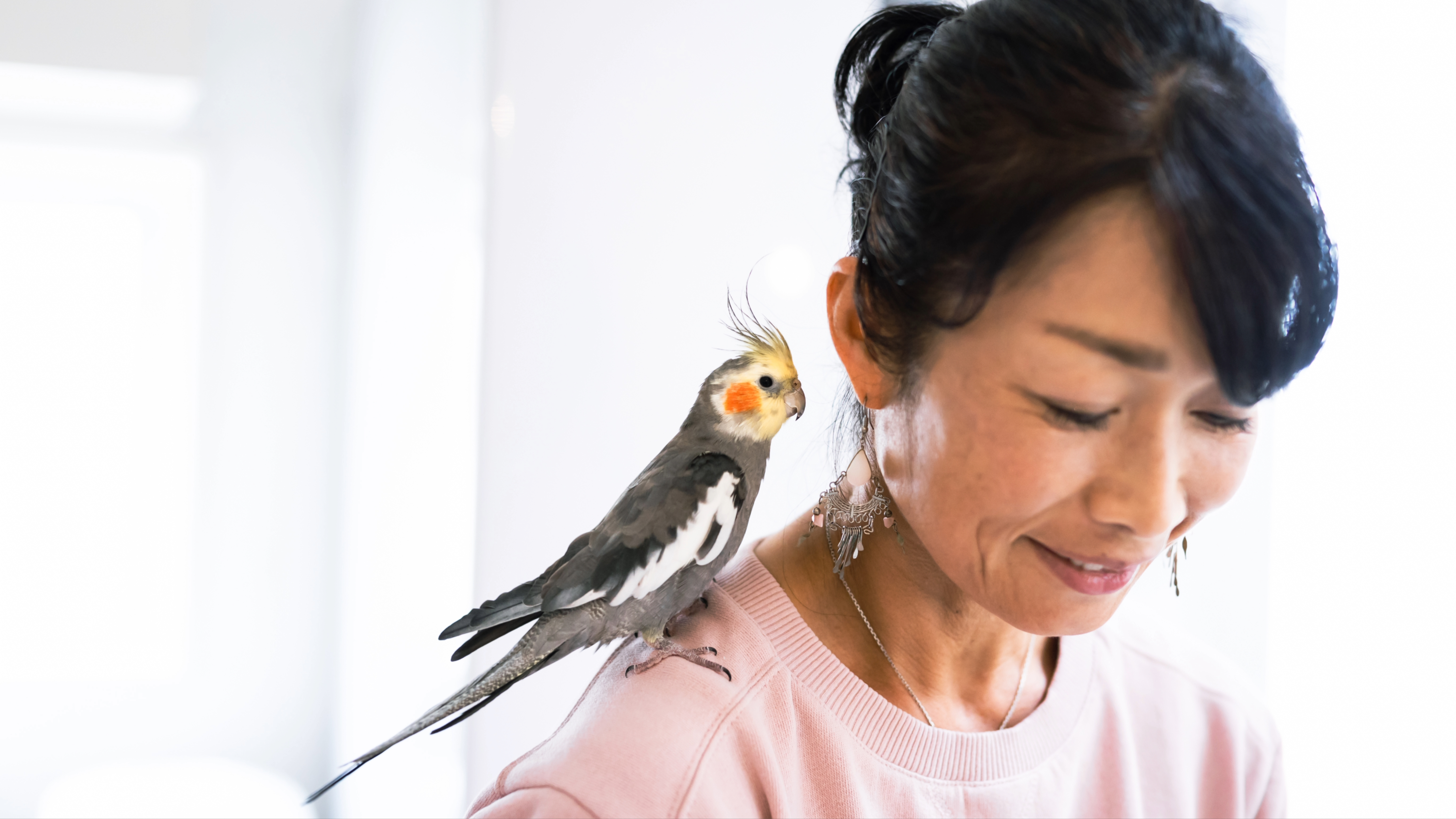
Just like cats and dogs, birds dislike prolonged and intense eye contact because, in the wild, it makes them feel like prey that's about to be attacked. Staring at your bird may cause them to feel stressed, anxious, or fearful, so be sure to avoid direct eye contact and use sideways glances instead. This will help your feathered friend to feel safe, relaxed, and comfortable in your presence.
18. Get to know their body language
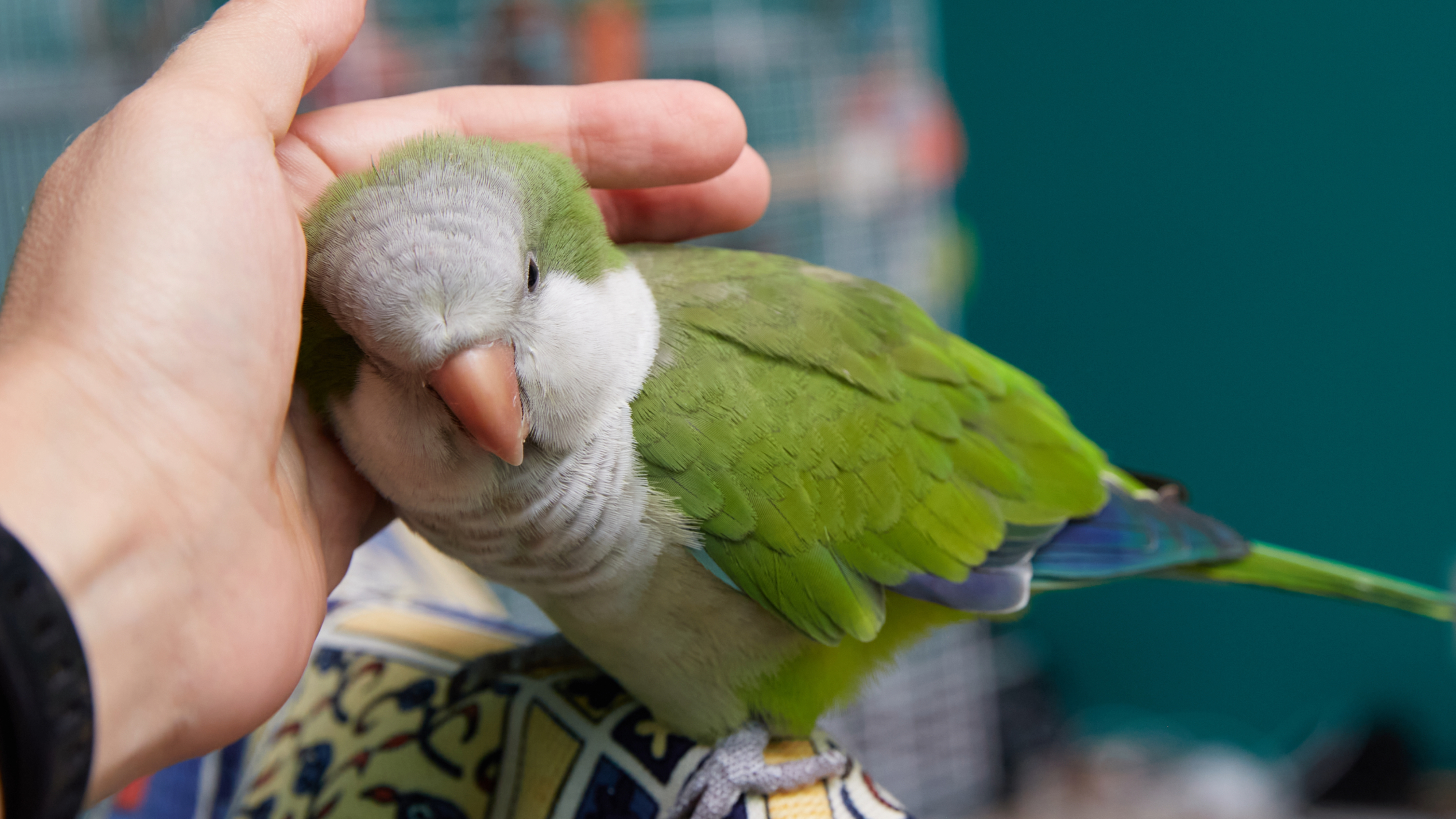
Understanding your bird's body language is key to building a strong relationship with them. Birds are very expressive creatures, and by observing their body language, you can get an idea of how they're feeling and what they might need from you.
One thing to pay attention to is head bobbing. If your bird is bobbing their head, that's a great sign they're excited to see you and want to engage. Gently wagging their tail or shaking it from side to side can also be a friendly gesture. On the other hand, biting or nipping may signal that your feathered friend is feeling overstimulated.
19. Let them fly
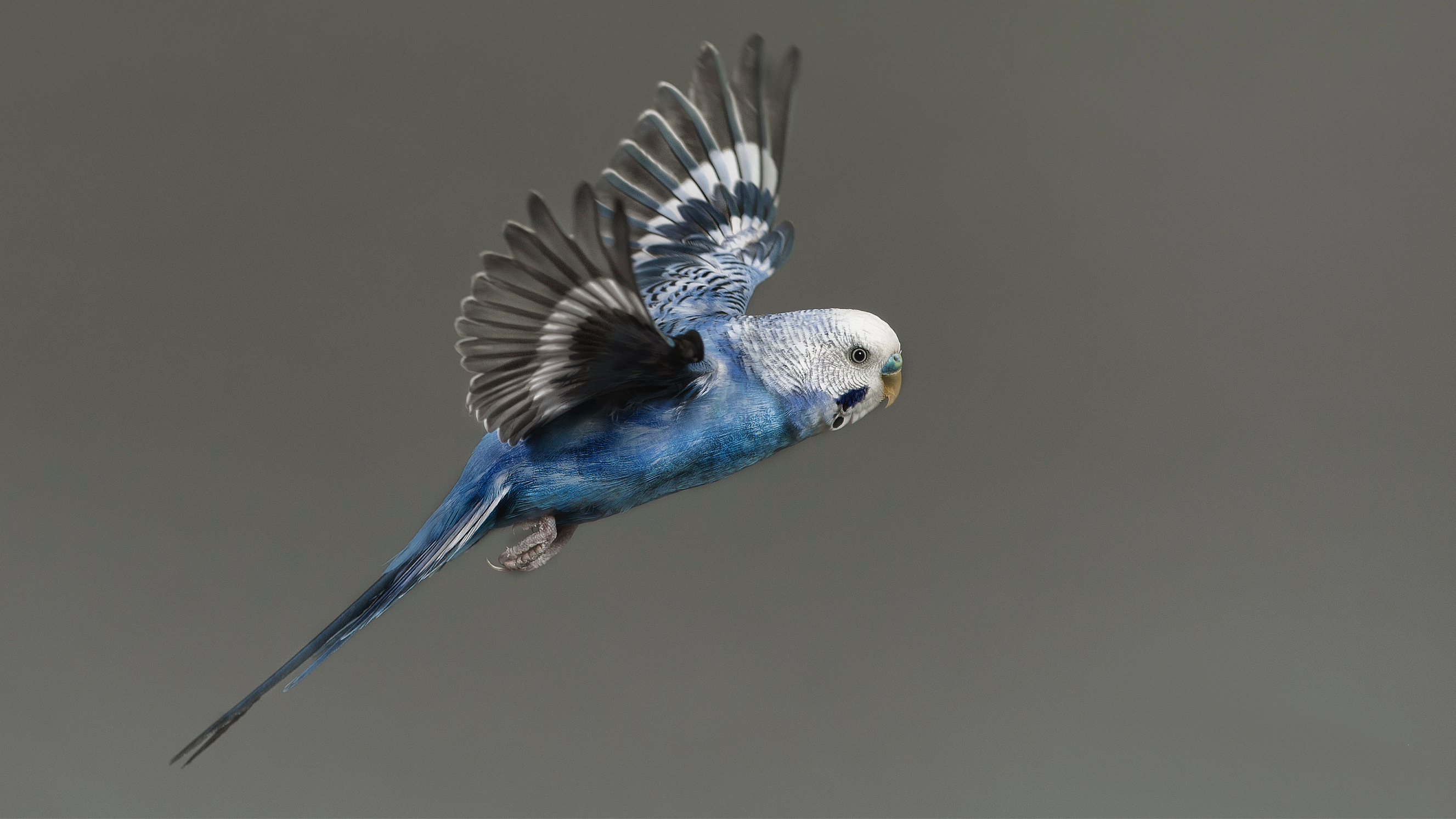
Keeping your bird in a cage for long periods of time can leave them feeling bored and frustrated. To prevent unwanted behaviors from developing and to help build a strong bond with them, be sure to let your beaked buddy have at least six hours a day to fly freely indoors.
Try to make as much of this interactive time between the two of you, even if it's something as simple as watching TV together or sharing a meal. Letting your bird be a part of your day-to-day life will help your friendship blossom.
20. Be patient
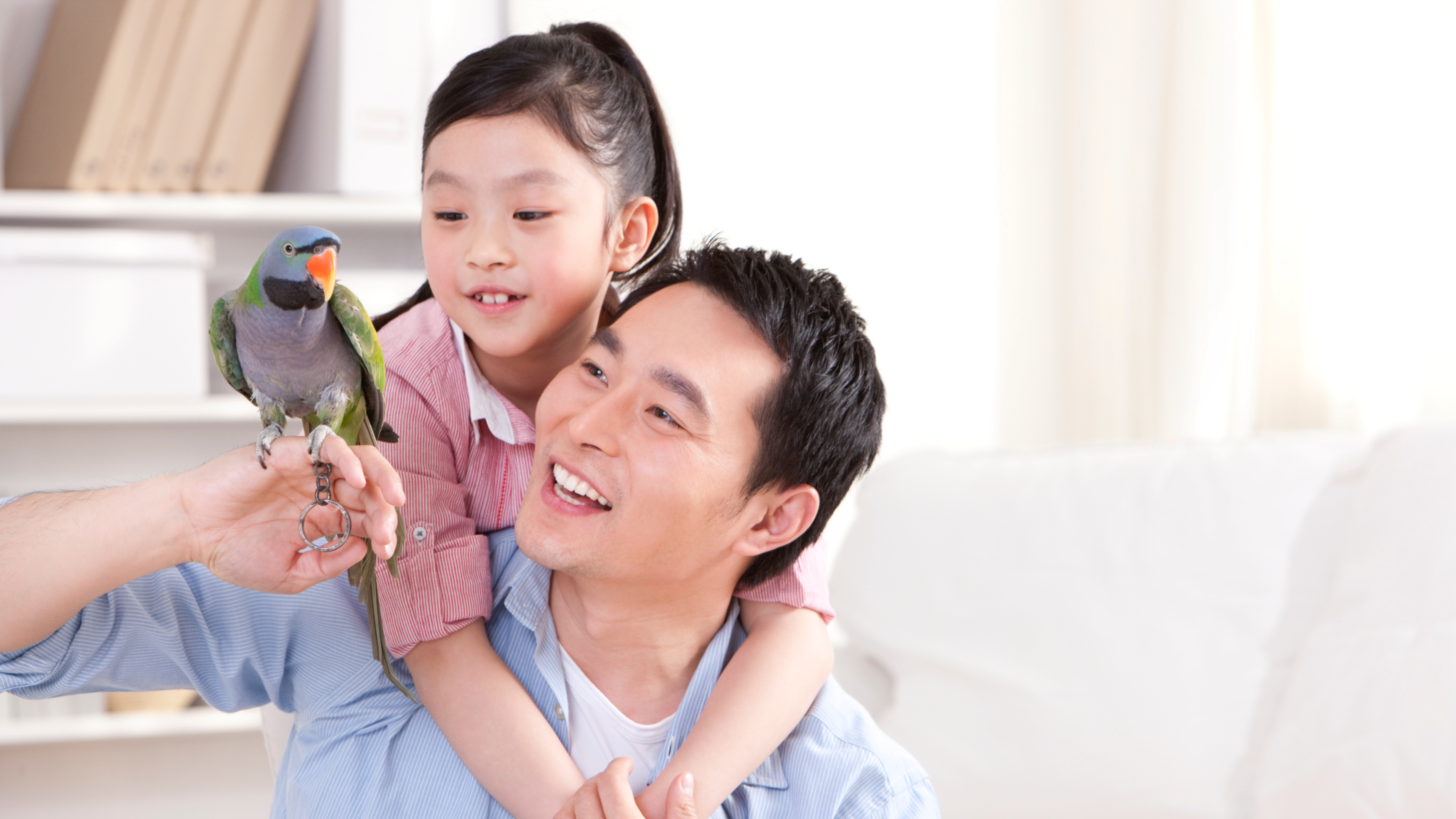
Just like human relationships, the relationships we share with our pets take time to build – and birds are no different. Your beaked buddy will need time to get used to you and their new environment, so moving slowly and being patient and consistent is key to ensuring you get off to a good start.
Read next: 32 types of pet birds
Edited by Georgia Guerin and Alexis De Leaver.

Kathryn is a freelance writer who has been a member of the PetsRadar family since it launched in 2020. Highly experienced in her field, she's driven by a desire to provide pet parents with accurate, timely, and informative content that enables them to provide their fur friends with everything they need to thrive.
Kathryn works closely with vets and trainers to ensure all articles offer the most up-to-date information across a range of pet-related fields, from insights into health and behavior issues to tips on products and training.
When she’s not busy crafting the perfect sentence for her features, buying guides and news pieces, she can be found hanging out with her family (which includes one super sassy cat and a kitten), drinking copious amounts of Jasmine tea and reading all the books.
She has written for a range of publications, including Fit&Well, Top Ten Reviews, LiveScience, Goodto, and Product Hunt.
